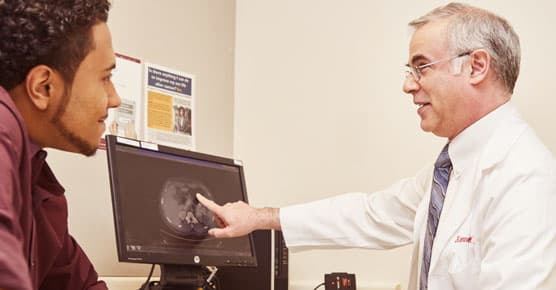Esophageal Cancer Diagnosis
When esophageal cancer is suspected, physicians look for evidence of cancerous cells and tumors within your esophagus, nearby lymph nodes and other organs.
At the University of Chicago Medicine Center for Gastrointestinal Oncology, some of the tests used to diagnose esophageal cancer include:
- Upper endoscopy: In an upper endoscopy, a thin, flexible tube is guided down the mouth and throat, into the esophagus. The physician can then view the inside of your esophagus, as well as insert instruments through the scope to remove a tissue sample for evaluation.
- Endoscopic ultrasound (EUS): EUS can help physicians determine the extent to which tumors have penetrated the esophagus or involved nearby lymph nodes. The endoscope is fitted with a special device called a transducer that emits and detects sound waves as they bounce off tissue. The transducer sends this data to a computer to create an image. In EUS-guided fine needle aspiration, physicians use EUS to provide direction for collection of a tissue sample.
- Probe-based confocal laser endomicroscopy (pCLE): Using one of the world's smallest microscopes, our doctors are able to view esophageal cells without removing tissue. This precise technique enables earlier and more accurate detection of esophageal tumors. In some cases, doctors may be able to remove your cancerous tissue immediately upon detection; in more complex cases, doctors may refer you to surgery.
- Computed tomography (CT): A CT scan is a noninvasive imaging test that combines X-rays and computer technology to produce images of the body. In addition to showing tumors of the esophagus, a CT scan can assist doctors in determining if your cancer has spread into other organs, such as the lungs or liver.
- Positron emission tomography (PET): PET is a sophisticated, noninvasive imaging test that measures the metabolic activity of cells. PET helps physicians find cancerous tissue that may not show up on X-rays or other tests.
- Laparoscopy and thoracoscopy: Laparoscopy and thoracoscopy are surgical procedures that involve the use of thin instruments equipped with a camera that are inserted into the body to look for tumors or gather tissue for a biopsy.
Information gathered from these tests can help your doctor determine whether your cancer has spread, and if so, to what extent.
Help for Patients with a High Risk of Developing Esophageal Cancer
If you have Barrett’s esophagus or are someone who otherwise has a high risk of developing esophogeal cancer, your physician may recommend you have regular endoscopies.

Cancer Care Second Opinions
Request a second opinion from UChicago Medicine experts in cancer care.

Participate in a Clinical Trial
Find an esophageal cancer clinical trial that's right for you.

Center for Esophageal Diseases
The Center for Esophageal Diseases is dedicated solely to the diagnosis and treatment of disorders of the esophagus.
